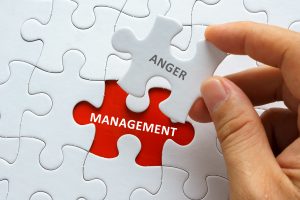Following a significant brain injury, damage to the frontal lobes and associated areas may result in emotional and behavioural dysregulation (i.e. loss of normal control of emotions and behaviour). The person may experience problems managing feelings of anger and may have reduced ability to express this appropriately resulting in behavioural difficulties.
The use of basic anger management strategies may be helpful in some cases. This involves supporting the person to recognise ‘warning signs’ of anger building up (e.g. increased tension, increased heart rate, rapid speech) and learn what they can do when they experience these warning signs.
Anger management skills can only be successfully taught when the person is calm. They should be practised regularly outwith the occurrence of episodes of challenging behaviour.
Anger management strategies include:
- Counting from 1-10.
- Learning to remove themselves from a difficult situation when they are becoming upset.
- Engaging in exercise e.g. going for a walk.
- Listening to music.

- Learning a helpful ‘mantra’ e.g. reciting the phrase ‘calm, quiet, still.’
- Using relaxation techniques e.g. controlled breathing techniques, visualisation, progressive muscle relaxation.
- Teaching the person to identify alternative and more appropriate ways of expressing anger/frustration/distress. Assertiveness training (appropriate communication of difficult feelings) may be helpful.
Please note that the ability to utilise any of the above anger management techniques is dependent on the person’s cognitive ability (including insight). It can be helpful to try and support the rehabilitation of the cognitive skills necessary for the person to implement some of these techniques. However, following significant brain injury, the techniques described above may not be helpful for some people.
Teaching of skills such as relaxation and assertiveness should be undertaken by appropriately experienced professionals.